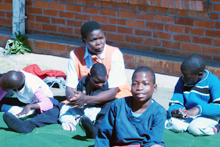
Building the Workforce to Help Orphans and Vulnerable Children
 “She’s 14 years old and HIV-positive. She has been taking ARVs her whole life but no one told her why she was taking medications. She finally confronted the doctors and asked for an explanation as to why she was taking the pills. The doctors answered her questions. She then had something of a crisis and became quite depressed. We have been working with her and we’re very happy because she seems to have recovered. You can see she is back playing with the other children and smiling again.”
“She’s 14 years old and HIV-positive. She has been taking ARVs her whole life but no one told her why she was taking medications. She finally confronted the doctors and asked for an explanation as to why she was taking the pills. The doctors answered her questions. She then had something of a crisis and became quite depressed. We have been working with her and we’re very happy because she seems to have recovered. You can see she is back playing with the other children and smiling again.”
This story was told to me during a recent visit to Haiti by a staff member at an NGO working with orphans and vulnerable children (OVC). It is a poignant reminder of the terrible costs of the HIV pandemic, which has created a large number of children who have lost a parent or live in a household with a seriously ill adult. In Haiti there are more than a million such children. This problem was exacerbated by the January 2010 earthquake, which resulted in an additional 150,000 orphans.
The needs of OVC extend beyond health services to include mental health care, schooling, food and nutrition, shelter, and protection from abuse and exploitation. The clinician or community health worker is usually ill-prepared to arrange and integrate the array of services needed by OVC. These are the skills of the social worker.
The story of the Haitian girl exemplifies how trained, supported social workers can have an important, positive impact on the lives of vulnerable children. For that reason, CapacityPlus is increasingly called upon to assist countries with developing the social welfare workforce. We are currently undertaking social welfare workforce development to serve OVC in Haiti, Kenya, Nigeria, and Zimbabwe.
The social welfare workforce (SWW) faces problems akin to those of health workers. These include severe shortages relative to need, education programs that produce too few workers and with insufficient quality, limited in-service training opportunities, maldistribution, attrition, weak management systems, and inadequate policy support. If anything, these problems are more acute for the SWW, which has received scant attention until recently. My trip to Haiti, which I undertook with Dr. Natalie Conner, a child protection expert, was the first step in helping the Haitian government develop a strategy for strengthening the social welfare workforce.
The strategy will include three essential elements for strengthening the workforce that can respond to the needs of OVC:
- Workforce planning with a focus on consulting with stakeholders, using data to inform planning, and aligning the workforce with the population’s needs
- Workforce development with a focus on aligning educational and training programs with workforce plans, strengthening the capacity of training institutions, and ensuring that the workforce has opportunities for professional growth
- Workforce support with a focus on attracting and retaining skilled workers where they are most needed, promoting high-quality performance, strengthening HR management systems, and growing professional associations.
 The challenge is finding a practical way to build a workforce that can respond to the needs of OVC. To accelerate progress, countries should consider focusing on expanding OVC access to trained caseworkers rather than professional social workers. Casework consists of using structured, evidence-based tools to assess, plan, and mobilize multiple services to meet the needs of children and families for safety, health, and well-being. The casework function is conceptually and practically distinct from holding the title of social worker or having formal academic training in social work. Casework denotes a set of competencies and tasks that might be carried out by a wide array of agents who have contact with OVC and their households. Making this distinction greatly expands the potential pool of individuals who might take on a casework function as part of their duties.
The challenge is finding a practical way to build a workforce that can respond to the needs of OVC. To accelerate progress, countries should consider focusing on expanding OVC access to trained caseworkers rather than professional social workers. Casework consists of using structured, evidence-based tools to assess, plan, and mobilize multiple services to meet the needs of children and families for safety, health, and well-being. The casework function is conceptually and practically distinct from holding the title of social worker or having formal academic training in social work. Casework denotes a set of competencies and tasks that might be carried out by a wide array of agents who have contact with OVC and their households. Making this distinction greatly expands the potential pool of individuals who might take on a casework function as part of their duties.
Caseworkers could be developed through relatively short-term didactic training (two to three weeks), followed by about six months of supervised practice. Using this approach could rapidly expand access to skilled caseworkers, while a cadre of more professionally trained social workers is established.
We are committed to pioneering new approaches to meeting the needs of OVC through new and innovative approaches to developing caseworkers—and then sharing our experience in the months ahead.
Related items:
Photo by Paul Marsden. (Caregiver and children at TOSE Respite and Care Centre, Harare, Zimbabwe)


